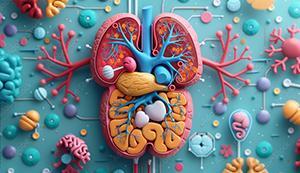HOW CHRONIC ILLNESSES AFFECT MALE FERTILITY AND PRESERVATION OPTIONS
For many men, the impact of chronic illness extends beyond day-to-day symptoms—it can also affect fertility. Conditions such as diabetes, autoimmune diseases, and other chronic disorders can impair sperm production, quality, and overall reproductive health. Fortunately, fertility preservation options, including sperm banking, offer men the opportunity to secure their reproductive future, even in the face of long-term health challenges.
This blog explores the ways chronic illnesses affect male fertility, the importance of early intervention, and the fertility preservation options available to men dealing with these conditions.
How Chronic Illnesses Impact Male Fertility

Chronic illnesses can disrupt male fertility in several ways, affecting sperm count, motility (movement), morphology (shape), and DNA integrity. These impacts often stem from the disease itself, the treatments used to manage the condition, or a combination of both.
- Diabetes
Diabetes, especially uncontrolled diabetes, can impair male fertility by affecting hormone levels, nerve function, and blood flow to the reproductive organs. Men with diabetes often experience reduced testosterone levels, which can lead to diminished sperm production. Additionally, diabetes can cause oxidative stress, leading to DNA damage in sperm cells.
- How It Affects Fertility: Men with diabetes may experience lower sperm count, poor sperm motility, and higher levels of DNA fragmentation. Erectile dysfunction, which is common in diabetic men, can also interfere with the ability to conceive naturally.
- Fertility Preservation: Sperm banking is a valuable option for men with diabetes, especially those facing difficulties with sperm quality. Early cryopreservation can help preserve healthier sperm before complications worsen.
- Autoimmune Diseases
Autoimmune diseases, such as lupus, rheumatoid arthritis, and multiple sclerosis, can also interfere with male fertility. These conditions can lead to systemic inflammation, which negatively affects the reproductive system. Additionally, the immunosuppressive medications used to treat autoimmune diseases can impair sperm production.
- How It Affects Fertility: Autoimmune diseases can reduce sperm production, impair hormone balance, and damage sperm DNA. Men with autoimmune conditions often have lower sperm counts and higher rates of infertility compared to the general population.
- Fertility Preservation: Men with autoimmune diseases should consider sperm banking early, especially if they are undergoing treatment with immunosuppressive drugs or other medications that can affect fertility.
- Cystic Fibrosis
Cystic fibrosis (CF) is a genetic disorder that impacts the respiratory and digestive systems, but it also has profound effects on male fertility. Approximately 98% of men with CF are infertile due to a condition called congenital bilateral absence of the vas deferens (CBAVD), in which the tubes that carry sperm out of the testes do not develop properly.
- How It Affects Fertility: While men with CF often produce normal sperm in their testes, the absence of the vas deferens prevents sperm from reaching the semen. This results in azoospermia (no sperm in the ejaculate).
- Fertility Preservation: Men with CF can preserve their fertility through surgical sperm retrieval techniques, such as testicular sperm extraction (TESE), followed by sperm banking. TESE allows sperm to be retrieved directly from the testes and frozen for later use in assisted reproductive technologies (ART) like in vitro fertilization (IVF).
- Klinefelter Syndrome
Klinefelter Syndrome (KS) is a chromosomal disorder that affects male reproductive health. Men with KS are born with an extra X chromosome (47,XXY), which leads to reduced testosterone levels, smaller testes, and impaired sperm production. The majority of men with KS are infertile, but advancements in fertility preservation techniques have opened new possibilities.
- How It Affects Fertility: KS typically leads to azoospermia (absence of sperm in semen) or oligozoospermia (low sperm count). However, small pockets of sperm may still be present in the testes, which can be retrieved using surgical techniques.
- Fertility Preservation: Testicular sperm extraction (TESE) can be used to retrieve viable sperm from men with KS. Once retrieved, the sperm can be frozen and used for future ART procedures, such as intracytoplasmic sperm injection (ICSI).
- Chronic Kidney Disease (CKD)
Men with chronic kidney disease often experience reduced fertility due to hormonal imbalances, particularly low testosterone levels. CKD can impair the function of the hypothalamus and pituitary gland, which regulate testosterone production, leading to hypogonadism (low testosterone) and reduced sperm production.
- How It Affects Fertility: CKD can lead to low sperm counts, poor sperm quality, and erectile dysfunction. Additionally, some medications used to manage CKD may further impair fertility.
- Fertility Preservation: Men with CKD should consider sperm banking early, especially if they are experiencing hormonal imbalances or fertility issues. Sperm cryopreservation allows men to preserve healthy sperm before their condition worsens or before undergoing treatments that could further impact fertility.
Medications and Fertility: A Double-Edged Sword

In many cases, the treatments used to manage chronic illnesses can have a direct impact on male fertility. While these medications are essential for controlling the disease, they can also interfere with sperm production, hormone levels, and reproductive health.
- Immunosuppressive Drugs
Immunosuppressive drugs, commonly used to treat autoimmune diseases and organ transplant recipients, can negatively affect male fertility. These medications suppress the immune system to prevent it from attacking healthy tissues, but they can also impair sperm production and reduce testosterone levels.
- Impact on Fertility: Immunosuppressive drugs can lead to lower sperm counts, poor motility, and decreased testosterone levels. Men taking these medications should consider fertility preservation before starting long-term treatment.
- Chemotherapy and Radiation
Chemotherapy and radiation are powerful treatments used to fight cancer, but they can also destroy sperm-producing cells in the testes. This damage can be temporary or permanent, depending on the type and dose of treatment.
- Impact on Fertility: Chemotherapy and radiation can cause azoospermia (absence of sperm in semen) or severely reduce sperm quality. Many men experience long-term infertility after cancer treatments, making sperm banking before treatment begins a critical option.
- Steroid Medications
Long-term use of corticosteroids, often prescribed for conditions such as asthma, rheumatoid arthritis, and lupus, can suppress the body’s production of testosterone. This can lead to reduced sperm production and lower sperm counts.
- Impact on Fertility: Steroids can cause temporary or permanent infertility, depending on the dosage and duration of use. Men taking corticosteroids may want to explore fertility preservation options if they plan to start a family in the future.
Fertility Preservation Options for Men with Chronic Illnesses
For men facing fertility challenges due to chronic illness, several fertility preservation options are available. Early intervention is key to maximizing the chances of successful fertility preservation and future family-building.
- Sperm Banking (Cryopreservation)
Sperm banking is the most straightforward and widely used method of fertility preservation for men with chronic illnesses. This process involves collecting semen, analyzing the sperm quality, and freezing the sperm in liquid nitrogen for future use. Sperm can be frozen indefinitely and used in assisted reproductive technologies (ART) such as intrauterine insemination (IUI), in vitro fertilization (IVF), or intracytoplasmic sperm injection (ICSI).
- Who It’s For: Men with conditions that affect sperm quality, motility, or count, as well as those undergoing treatments that may impair fertility, such as chemotherapy, immunosuppressive drugs, or radiation.
- Testicular Sperm Extraction (TESE)
For men who are unable to produce sperm through ejaculation, such as those with cystic fibrosis, Klinefelter Syndrome, or azoospermia due to chemotherapy, TESE offers an alternative method of sperm retrieval. In this surgical procedure, sperm is extracted directly from the testes and can be frozen for future use.
- Who It’s For: Men with conditions that prevent sperm from being present in the ejaculate, such as men with CF or KS.
- Hormonal Therapy and Fertility Preservation
In some cases, hormonal therapy may be used to improve sperm production in men with chronic illnesses. Testosterone replacement therapy (TRT) can be helpful for men with low testosterone levels, but it can also suppress sperm production. As a result, men should discuss fertility preservation options before starting TRT.
- Who It’s For: Men with hormonal imbalances, such as those with chronic kidney disease, Klinefelter Syndrome, or diabetes, who may need testosterone therapy but want to preserve fertility.
Conclusion
Chronic illnesses can have a significant impact on male fertility, but early intervention and fertility preservation options such as sperm banking and testicular sperm extraction offer men the chance to secure their reproductive future. For men facing conditions such as diabetes, autoimmune diseases, cystic fibrosis, or Klinefelter Syndrome, fertility preservation can provide peace of mind and long-term security.
Healthcare providers play a crucial role in educating men about the risks chronic illnesses pose to fertility and guiding them through the process of fertility preservation. With the right approach, men with chronic illnesses can take proactive steps to ensure they have the option of starting a family when the time is right.

